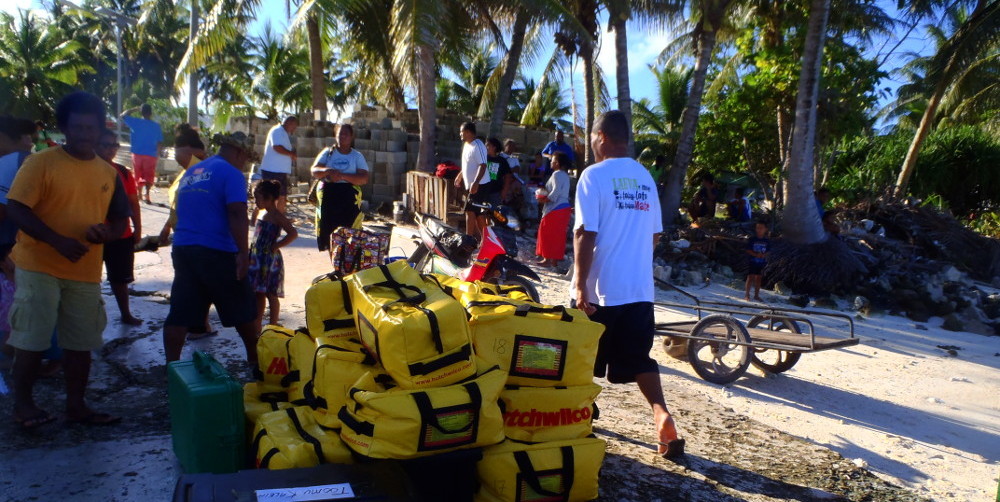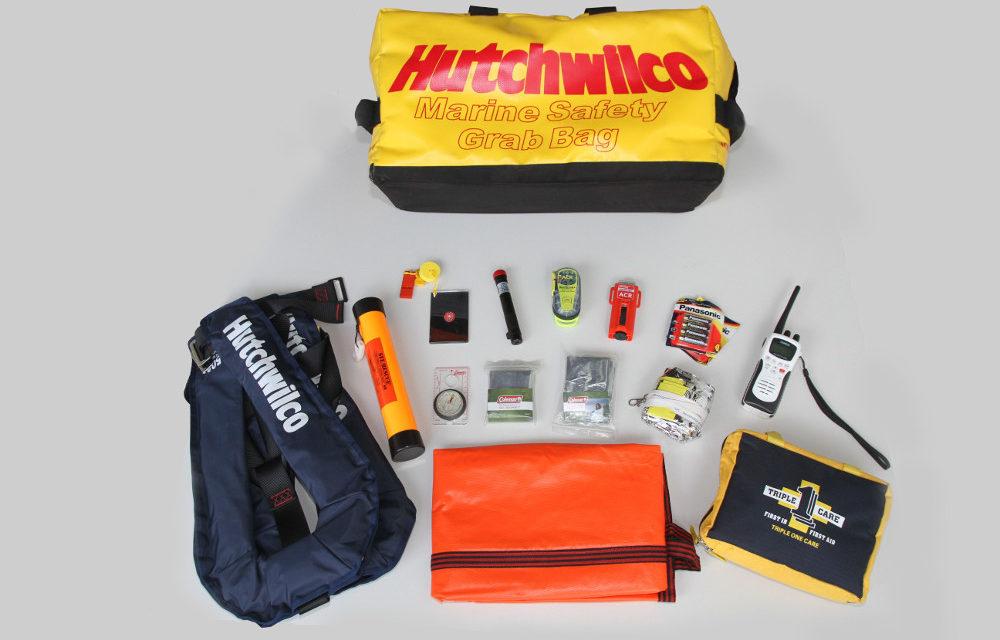On 4 March 2018, four fishers were rescued from a small vessel in Tuvalu after activating the PLB (Personal Locator Beacon) from their emergency ‘grab bag’, a marine safety pack initiated and promoted by SPC and supported by the Tuvalu government. This rescue is the fourth reported, and at least 10 fishers have now been rescued from small vessels since the distribution of grab bags began in 2015.
Coastal resources are an important source of nutrition, food security, culture, employment and recreation throughout the Pacific. In Tuvalu, 74% of households are engaged in reef fishing to some degree. Small vessels (less than 7-8m) are widely used in both commercial and subsistence fishing, as well as inter-island transportation and recreational diving.
Local fishers face many risks at sea in small vessels, including bad weather, engine failure, fires, improper vessel construction, overloading, prolonged trips and limited safety equipment and training. In Tuvalu, the high use of single outboard skiffs navigating between far flung, low lying islands compound these risks even further.
Making matters worse for fishers, environmental damage to coastal ecosystems has forced many fishers to switch their effort from harvesting reef and costal species to oceanic resources. Fishing further from the coast to avoid overfished coastal reefs and lagoons increases the likelihood that fishers will not be visible from land and will be outside of mobile phone signal range.
Given their widespread use, most maritime incidents involve small-scale fishers using small vessels. This is particularly challenging when many countries and territories throughout the Pacific, including Tuvalu, do not have well developed small vessel safety regulations or a strong culture of marine safety awareness among small vessel operators and fishers.
SPC has been spearheading the use of grab bags since the mid 1990’s to ensure that local fishers on small vessels have essential safety equipment easily accessible in a compact, waterproof bag to allow them to signal for help and ensure survival in an emergency. Installing grab bags and training fishers in their use does not replace the need for national law reform, but it helps support and supplement national regulations.
In 2015, the grab bag programme was introduced in Tuvalu by SPC as part of the EU-funded DEVFISH2 project. SPC’s Nearshore Fisheries Development Section ordered the first shipment of grab bags to Tuvalu, and then provided training sessions alongside the Tuvalu Fisheries Department. The training is an important part of the distribution process, ensuring that fishers understand what is contained in the grab bags, how to use the items in an emergency, and how to maintain the grab bags.
Initially, 30 bags were issued to fishers using small vessels. After this early success, the Tuvalu Fisheries Department secured funding to distribute a further 168 emergency grab bags to fishers on Funafuti and the outer islands between 2015 and 2017.
Since their introduction in 2015, there have been four reported rescues using the grab bags. In early 2016, an outboard powered fishing boat with three fishermen experienced engine failure and was drifting for 10 hours. The fishers on board used the sea anchor from the grab bag to slow down their drift, and used the rescue laser to draw the attention of a passing boat to rescue them.
In the beginning of 2017 a small vessel with two fishers experienced engine failure. They attempted to use the VHS radio but were unsuccessful, so they activated the PLB from their grab bag and were rescued 6 hours later. The following day, another fisher experienced problems and activated his PLB. He was rescued 24 hours later.
In December 2017, another small vessel with two fishers on board again faced engine trouble. The fishers were rescued without using their grab bag, but it was critical to their safety that they had emergency equipment at hand should their situation had worsened.
The most recent incident occurred on 4 March 2018. The fishers were rescued after spending 29 hours adrift after their engine failed. They were located after they activated the Personal Locator Beacon from the grab bag.
The cost of search and rescue operations where small vessels are not equipped with grab bags is enormous – for the 2016-2017 year, it is estimated that New Zealand alone donated upwards of NZD 8 million towards search and rescue in the Pacific. By using the equipment contained in a grab bag, local patrol teams can be recruited to rescue fishers. As well as being much more cost effective, it is estimated that fishers are rescued on average 20 hours quicker when the grab bags are used. This time saving helps to reduce the physical and social cost to fishers and their communities of experiencing a maritime emergency.
So far, the grab bags helped save the lives of 10 fishers in Tuvalu, and saved millions in expensive search and rescue operations. It is hoped that after the successful distribution and use of grab bags in Tuvalu, other Pacific Islands countries and territories will increase their efforts to promote the concept of grab bags to small boat operators and seek funding to distribute these potentially life-saving tools. SPC’s Nearshore Fisheries Development Section will be available to support any such initiatives with technical advice and training.

